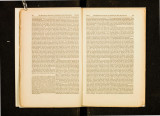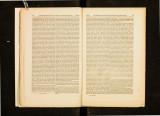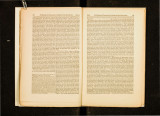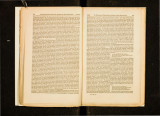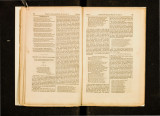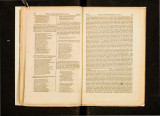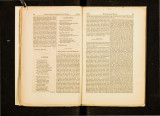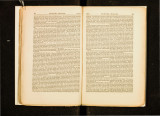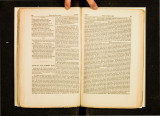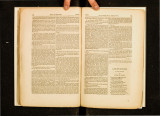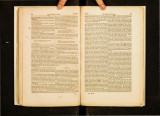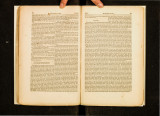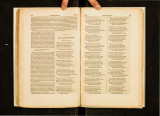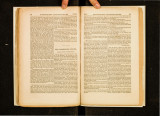| OCR Text |
Show 466 Tlte j)fassaclwsells Proposition for Abolishing t!te Slave R ej,resentation. [AUGUST, sachusetts. During the Re,·olution, her gallant work, at the suggestion of Utopian projectors, as sons won imperishable honors, and the citizens of impenious to reason as they arc deaf to the lessons that State may, with exultation and pride, contem- of experience! Have those of her citizens, who plate the glories of Lexington and Bunker l.Iill. have presented the issue oflhe abolition of slavery or Prior to the Revolution, during its continuance, and the dissolution of the Union,• soberly considered the for a time subsequent to the establishment of the evils which, in all human probabilit.y, would result Federal Government, 1\b.ssachusetts exhibited a fwm a dissolution of the confederacy 1 Let them spirit deserving commendation and worthy of re- remember the advantages which Mass-achusetts has mcmbrance, but on suudry occasions si nC'e, her con- reaped and is still reaping from the Union. ln duct, in reference to l1er federal relations, has sub- comparing the present condition of thJ.t commonjected her to anim:tdversion alil.;c just and SC\'ere. wealth with what it W3S sixty years ago, how can She has no cause to exaggerate the influence of they fail to be struck with the COJttrast ~ Not only has the sl;we representation, or to complain of the Boston advanced with giant strides in population, action of the General Government. The uaviga.- wealth and refinement, but the te rritory of the tion laws, passed by Cnngress, have fostered hPr State has become dotted over with beautiful towns shipping, and her ships, freighted with the varied and villages. From time to time, the ear is saluted products of her factories, now traverse every sea by the cheering hum issuing- frnm the numerous and are found in e\·cry clime. Her fi sheries have factories of an industrious and thrifty population, been protected by bounties,• and her diversified and the eye of the traveller beholds with delig ht the manufactures have been cherished by a system of many gli8tcning steeples wllich de\'Olion and g ratilegislarion, regarded by several other States as tude have reared to the glory and honor 'of Omnipoprejudicial to their interests, however beneficial to tence. Owing to increased opulence, rountless those of Massachusetts. llesidcs seeing two of schools have been opened, many colleges ha\'e been her sons elevated to the l1ighest honor known in founded and education thereby diffused. Homely this Republic, she has seen several others sent dwellingshavebeeusupersededbygorgeouspalaces, abroad on the most important foreign missions, and :tnd the unostentatious dress of the pilgrim fil.thcrs others presiding in the cabinet, nr occupying se:trs has been exchanged for attire befiuing the nobles on the bench of the hil,!hest judic-ial triUunal. En- of Venice when at the heirrht of hc1 renown. couraged in all her industrial pursuits, participating Ror~k.v fields have been con:crted into enchantlargely in the distribution of official station and po- ing gardens, perfumed by costly exotics, ubtai11ed litical honors, why should she complain Clf Southern through the instrumentality of a commerce varied in institutions, and attempt to get up a crusade which character, and profuse in its returnl'l. If satiated would inel'itably terminate in the extirpation of one with the pomp and disgusted with the vanities of the or the other portion of the Southern population 1 world, Massachusetts can easily renounce them, Prosperity may have so intoxicated her, as to have and resume the simple l1abits of the puritans, withimpaired tl_wse fratern_al feelings towards the other out withdrawing fwm the confederacy, abolishing States wh1ch she evmced during the memorable slavery, or the sb.ve repre se ntation. period of the Revolution , but we trust that the com. ~'lassachusetts has long enjoyed a large share of prehensive patrioti sm and enlighrened public spirit the carrying trade. "While the home market afwhich distinguished her in I iSi, have not departed furded by nearly twenty millions of peo])le has been forever from her bosom. Let not Massachusetts open to the productions of her f:.tctnries.t A disdeceive herself. The treacherous plaudits of Eng-lish abolitionists, superadded to the huzzas of fanatics at ho.~e, can not im_part to her a sat~sfaction more pr:s::t:~ta1~~n~~;;:l::i~~~e~"u7~~si~;i;:~~~~i::,~.Y£~,~~~~~ e_xqutstte and endurm_g than tlmt wlu~h she can de- Quincey, George Admn~ and many other~, whu say, that nve from the conSCIOUSness of havwg fully and "deeming sla~e-holding a heinous sin, and convinced th11t fairly Ctltnplied with her obligations as a member of slavery ought to he innnedia~ely and fon·•·er allolished, they this Union. A patriotic and virtuous people will !ook upon ~he Constitu_tion of_lhe U~ited Sta~es IIS _enjoi n. not exchange the solid satisfaction arising from the J~g obhgal.l.ons Jtnd JutJes 11 Inc~ are li\Compat1hle wJth ailefaithful performance of duty, for the evanescent :~:~~~~~cri;h~~rl, :.n<~ \Hth th: enJoy~cnt of !rcedom an<l of pl::sure of ~e.re h~man applause. "In_ view of these facts, your memorialists, dib-claimi11g citi· . re a maJOrll Y of the people of Massachusetts u11~h•p, an.d reptulwting tht pre~tt1t Co-,u,·titwion as a • cove· dtsposed to disregard tl1e opinions, to renounce the n11nt with death and an agrl'ement wtth hell ,' a.sk you to principles of their fathers, and immolate their great tHke immediate !1\l'u~ures, Uy a National Convention, or otherwi se, for di.s~olnng the Union of these States." + In 1810, l\fassachtJSctts had a &'l.piral tl( eleven mil-lions, seven hundred thousand dollars, invested in I he tishe· t In 1810 Ma~~a('hu~ert~ ownl"!d nearly one sixth part of ries; and the \\hole amount of capital i_n~ested in like man- ~~:t~:~~~;:~~~:e~::i:~~:~:~r;:~~~~~e: ;~r~l:is11~0~~~~~·11':11:~:: ncr by all the other States, was four uull10n, seven hundred employed. The manufacture of woollen good~ in the United thousand dollars. Slates in 18·10 <llnountcd to ,'j!;20,fJ()!),fJ!JfJ, of which Massi!.- 1845.] Poems. 467 solution of the Union woulrl diminish the tonageof Massachusetts, greatly impair her commerce and deprive her manufacturers of that extended home market which they now possess. The manufactured articles of that State, would then be subjected in the Soutl1ern ports to the same or higher duties than would be imposed upon similar articles of European industry. She would encounter competition with that foreign "pauper labor," which l\Iassachnsetts is too sagacious not to dread, and against which her representatiHs have often implored Congress to save and protect the citizens of that commonwealth. In addition to these things, Massachusells can not be ignorant that the spirit of aggression is often emboldened by the weakness of an adversary; that the chances of war frnm commercial jealousy and rivalry would be augmented, as weH as from the mutual crimination and recrimi- 11ation of the several States, who would separate in a temper quite unfriendly to the harmonious adjustment of conflicting demands. ,,-hile pondering on a subject so momentous as that of the separation of these States, let the abolitionists glance over this v11St empire, and think for a moment of the power and grandeur which it has attained under the operation of the present Government. The world has never exhibited so magnificent a spectacle of human happiness, industry and progress. Improvements in the arts and sciences ha\'e corresponded with the rapid augmentation of wealth and population. Agriculture has been gre:1tly extended; commerce and manufac· lures have been nurtured and developed; cities have sprung inLO existence; canals and railways have been constructed; and li berty, peace, religious toler:l.tion and general happiness have prevailed. Why, by dissolving the Union, terminate a connexion which exhibits results so gratifying, prospects so brilliant and so encouraging 1 Far, far better will it be for us all to heed the warning voice of that illustrious patriot and sage, who, in his Farewell Address, exhorted his countrymen to" cherish a cordial, habitual and immovable attachment to the Union ; watching for its preservation with jealous anxiety and indignantly frowning upon lite firsl dawning of every attempt to alienate any portion of our country from tlte rest." R. T. H. Virginia. chusctts made $7,082,000 or over one third. During lhe same year the m;1nufactures of cotton goods were valued at $46,350,450, of which the ('Oltons manufactured by Mas~achusetts were valued at $16,553,400. The domestic exports of cotton fabrics from the United States for that year were aUout three millions. If all the cotton goods now exported from the United States were furnished by Ma3sa· chusetts alone, she would still have a surplus of 12 or 13 millions to dispose of in the home market POEMS. BY 1-J. P. VA::lS , DECEASED. A FRAGMENT. Alone upon the b!lnks of that dark sea, Whm•e IJillows raged on Pharaoh's impious tJanJ, Again the traveller wandered wearily, Far from his home and from his native land: Wi1h llnxiousstcpllepacedthelonelyshore, And marked with dread the gathering t<'mpest nigh, \Vhile the rlark lJJilows' resounding roar Oft mingled withthesea-hird"spierdngcry. While thus his bosom throl•b'd with rising fears, Faron the W::t.l"e a shattered hnrk appears, Nenr and more ne11r the stranger ve~scl drew, And lo! upon its deck a phantom form, Which seemed the sp1rit of tlw ho\\ling storm. His nn-cn locks were flo;1ting in the blast, And e\·cr nnd anon his look W<tS cast Upon the dark'ning sky-nor seemed to fear, For well he knew his destined hai'Cn near! \Vhere the frail bark appron~·hed n courser stood, \Vhose flowing mane s"evt down and kissed the flood; Of1 with impatient stamp he beat the shore, And seemed to scorn th~· wild wa1·cs' dashing roar. "Ah !"cried the traveller, "full well [know Th .. t demon form, that dark and vengeful hrow ! Dillst thou not 1ell me, Spiri: ! thou woulclst slay Three thousand only on that dreadful day, When last I met thee far bPyond the main 1 And lo! ten limes the number strew the plain!" "1\ly words were true," the ghastly fiend replied. " I slew I hem not-from craven fe:~r they died." The spectre ceased, wbilc louder grew the ~torm, And the quick lightnings glimmered thro' his form, The giant wareil now rcar"d their heads on high, And scem'd to muk th' artillery of the sky; Loud roarf'd the winds-and lo! a driving cloud Wr11pp"dthe fel11lemon in ilsSHblcshroud; The pilgrim looked around rbe plain, But horse or riderr.eversawagain. TO CELESTE. Oh! never yet was mortal blest With bcav'nly charms like fair Cclcste\ Vhen like a fairy on the green, She glides along the sylvan ~eene, \Vith .>tcp so graceful and so !ighl, Thatmortalsral'ished with the sight, 'l'hink her some spirit frorn allo~·e- Some wanderer from the realms of lol"e, \Vho left her own brillht nati1-·e ~pht:ro To shine with pccr!cs:,c lustre here! The rose bends not more gracefully, Wbcn summer winds pass gently tJy And waft its fragrance on the gal(', Thntsighs along the peaceful vale. And in hersoftexpre11sive eyes, Bright as her own lo1·ed summer skies, The power of sweet enchantment lies. "Why sho~o~ld she speak, whose looks express So much of grfi('C and !OI'eliness, Whose every glance and Rctionseerns Bright11sthePoet'srapturousdreams? Sure Nature l~nguage never meant, When silenco is so eloquent. |







